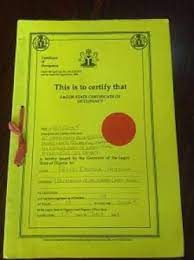Demystifying the Certificate of Occupancy (C of O) in Nigerian Real Estate: Costs, Requirements, and Process
The foundation of the real estate world in Nigeria lies in a crucial document known as the Certificate of Occupancy (C of O). This document is more than just a paper; it’s the cornerstone upon which the aspirations of real estate investors in Nigeria are built. Understanding the intricacies of the C of O is not merely a choice but a necessity.
In this comprehensive guide, we’ll navigate the complex terrain of C of O’s, shedding light on their costs, requirements, and the step-by-step process to obtain one. Our aim is to offer thorough education to the general public, with a special focus on real estate investors. The complexities surrounding C of O’s can be overwhelming, but knowledge is the key to success.
As we explore this subject, our goal is to demystify these complexities and equip individuals with the insights necessary to navigate Nigeria’s real estate domain.
The Significance of Certificate of Occupancy
Before diving deeper into the details of the Certificate of Occupancy (C of O) in Nigeria, it’s vital to grasp its profound importance in the real estate landscape. This document isn’t just paper; it stands as an undeniable proof of land or property ownership. The C of O isn’t a mere formality; it’s a robust legal instrument designed to protect property owners’ interests.
In the intricate realm of real estate, it acts as an unwavering guardian, ensuring that property owners’ rights are not just acknowledged but rigorously defended. Essentially, it serves as a shield against potential land disputes.
It’s the bedrock upon which all real estate transactions securely stand, akin to a lighthouse guiding ships through treacherous waters. Conversely, the absence of a C of O can pose a significant hurdle. Without it, real estate dreams are vulnerable to uncertainty and disputes, potentially leading to a turbulent journey in the real estate world.
As we journey through the realm of C of O’s, remember that it serves as a steadfast anchor in this dynamic landscape.
Understanding the Costs Involved
Financial readiness is paramount when pursuing a Certificate of Occupancy. Adequate budgeting is crucial due to potential variations in costs, which depend on factors such as the property’s location, size, and desired processing speed.
The costs can be categorized into key areas, each playing a pivotal role in the acquisition process.
Application Fees: This initial financial commitment initiates the C of O application process. The specific amount can significantly vary depending on the state within Nigeria, ranging from thousands to tens of thousands of Naira.
Survey and Land Valuation Fees: These fees determine property boundaries and current market value, crucial for taxation and legal documentation. Costs vary based on property size, location, and state requirements.
Legal and Documentation Fees: Essential for navigating property ownership complexities, covering document preparation, consultations, and ensuring undisputed ownership.
Consent Fees: Not always mandatory but can be crucial for validating property status, often requiring approval from state authorities.
Processing Fees: Cover administrative tasks crucial to the acquisition process, including application scrutiny, document verification, and site inspections.
Stamp Duty and Registration Fees: Once the C of O is obtained, stamp duty and registration fees are essential to make the document legally binding and ensure property rights’ protection.
Obtaining a C of O demands financial preparedness. Costs can vary significantly across states, so consulting experts specializing in real estate transactions is prudent to get precise cost estimates.





